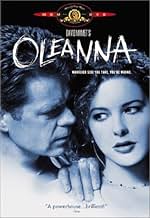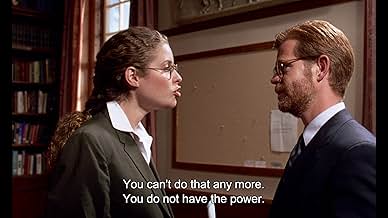PUNTUACIÓN EN IMDb
6,5/10
3,8 mil
TU PUNTUACIÓN
Cuando un estudiante visita a su profesor para discutir cómo falló su curso, la discusión toma un giro incómodo.Cuando un estudiante visita a su profesor para discutir cómo falló su curso, la discusión toma un giro incómodo.Cuando un estudiante visita a su profesor para discutir cómo falló su curso, la discusión toma un giro incómodo.
- Premios
- 1 nominación en total
Diego Pineda
- Quarterback
- (sin acreditar)
Scott Zigler
- Clerk in Copy Shop
- (sin acreditar)
Reseñas destacadas
Unique, hyper-real film where the dialogue is the main plot - and what a rivetting plot it is. I was very skeptical about Oleanna, and was really resistant to it - but was very surprised to find myself succumbing to it. If you love language, and know enough language, Oleanna will be a joy for you: because the dialogue is loaded with jokes about dialogue. You'll be able to pick the places where Bill Macy is saying non-words, pretentious words or jargons in his monologues - and notice where somebody is talking ambiguously, or not saying anything at all.
Its about words, talking and meaning. So there are lots of words for good reason.
Its very dialoguey dialogue: not the kind of things people say, but the kind of things writers write. Reminiscent of the verbal gymnastics of Samuel Beckett, and the twisting meanings of Catch-22. Or perhaps the comedic pretentiousness of Hal Hartley. Meaning is controlled by the powerful - that's the key. Whoever controls the conversation, the language, in this movie - controls the situation. So everything is either ambiguous or figurative. Mainly, the exact things the two say are not what's key. Its which one of them is talking.
The performances - well, Macy at least - are in an appropriately hyper-real tone to suit the hyper-real dialogue. The girl is not very good, but this is still a masterpiece of language. Its static, centring on two characters and one room, but for good reason - to put the words centre stage. I'm so shocked that i just watched a movie with two characters and one room, and was not only not bored once, but hanging on each word and found that the time flew by.
The moral of the story is that things are bound to go wrong if you talk to somebody for the length of an entire movie. You're bound to go nuts. The viewer is bound to go nuts just listening to William H Macy in the first half-hour of the movie - you'll be amazed that purely talking to someone, using words, can make you feel that you're trapped, that you can't win or even escape.
Quite brilliant, really.
8/10. Essential viewing. I never knew dialogue held this power. A unique discovery.
Its about words, talking and meaning. So there are lots of words for good reason.
Its very dialoguey dialogue: not the kind of things people say, but the kind of things writers write. Reminiscent of the verbal gymnastics of Samuel Beckett, and the twisting meanings of Catch-22. Or perhaps the comedic pretentiousness of Hal Hartley. Meaning is controlled by the powerful - that's the key. Whoever controls the conversation, the language, in this movie - controls the situation. So everything is either ambiguous or figurative. Mainly, the exact things the two say are not what's key. Its which one of them is talking.
The performances - well, Macy at least - are in an appropriately hyper-real tone to suit the hyper-real dialogue. The girl is not very good, but this is still a masterpiece of language. Its static, centring on two characters and one room, but for good reason - to put the words centre stage. I'm so shocked that i just watched a movie with two characters and one room, and was not only not bored once, but hanging on each word and found that the time flew by.
The moral of the story is that things are bound to go wrong if you talk to somebody for the length of an entire movie. You're bound to go nuts. The viewer is bound to go nuts just listening to William H Macy in the first half-hour of the movie - you'll be amazed that purely talking to someone, using words, can make you feel that you're trapped, that you can't win or even escape.
Quite brilliant, really.
8/10. Essential viewing. I never knew dialogue held this power. A unique discovery.
The tag line of this movie is that "whichever side you take, you're wrong," is itself wrong. There clearly is a wrong and right side. If we were to sit Catherine McKinnon and Andrea Dworkin down and show them only the first half of the movie, even they would be pressed to find any sexual harassment (let alone rape). We would find a self-absorbed professor, and knifing student (whose clipped speech, and apparent dumbfoundedness is belied later when she fabricates, embellishes, and spins the truth for her PC ends). If being self-absorbed is enough to get one fired and falsely accused of rape, then Mamet's lesson must be that the feminist orthodoxy has gone too far.
David Mamet can write a play! This one made me writhe with anger at the P.C. crowd in our universities (not that all PC is bad--I am a linguist)who are watering down the national education. What's wrong with saying what you mean? I am a woman and I cannot actually believe that there are two sides on this issue...a pat on the back cannot possibly be seen (alone) as sexual harassment, nor can writing a very bad essay merit an "A" in my idealistic mind. A poor writer is a poor writer, no matter what the background. Many of out best American writers have come from the working class. Should education be modified yet again to accommodate those who do not care to work for their merits? Just a thought. Would love to hear more from others...
This film is basically about a student who cannot accept she's failing class and decides to ruin her teacher's life by framing him. Around this basis, a quite witty dialogue is unfolded, which makes the movie intellectually stimulating and powerful. Additionally, it depicts the invalidity of some axioms of both professor and student community and portraits how people manipulate the truth to serve their personal interests. A very strong point is how pompous and cliche arguments about void pseudo-liberties alienate people from truly disastrous and desperate situations. As I see from other reviews, the play was much better, but unfortunately we didn't have the chance to see it here in Greece yet, so my first impression of Mamet's work was from this movie.
10oowawa
One writer perceptively suggests that the term "Oleanna" was used to describe swampland being sold as prime real estate.
I think the primary context in which the title "Oleanna" is to be understood appears in a "folk" stanza preceding Mamet's published edition of the play:
"Oh to be in 'Oleanna,'/ That's where I would rather be,/ Than be bound in Norway/ And drag the chains of slavery."
And so, Oleanna is a version of a Utopian promised land, and in the context of the play, the gateway to this better tomorrow is through the halls of Academia. Susan, the victim of her own false expectations of how the university is to transform her existence, repeatedly mentions the struggle she had to endure in order to get into college. For her, academic success is central to her vision of a better life. John, the pedantic professor, also sees Academia as the means to a comfortable, upper middle class existence with his new house, wife, and son. All he needs to do is make tenure, and his future is secured.
However, John presents himself as an academic bad-boy who debunks the very Academia with which he is trying to secure his comfortable future. This ridicule of the academic process strikes at the heart of Carol's dreams of a better future through education. She quite rightly sees that the professor is trying to have it both ways--playing the academic outsider while trying to kiss-up to the tenure committee in order to ensure his cushy new home in the suburbs. When someone's dreams are threatened, they become angry and strike out, however they can.
This is a brilliant movie. Anyone working in a high school or university, and anyone contemplating an academic career, needs to watch it, and allow it to soak deep into the structure of the brain. Perhaps that academic career isn't such a good idea, after all. Maybe that utopian real estate is really swampland. At any rate, one needs to be very, very careful when dealing with students.
I think the primary context in which the title "Oleanna" is to be understood appears in a "folk" stanza preceding Mamet's published edition of the play:
"Oh to be in 'Oleanna,'/ That's where I would rather be,/ Than be bound in Norway/ And drag the chains of slavery."
And so, Oleanna is a version of a Utopian promised land, and in the context of the play, the gateway to this better tomorrow is through the halls of Academia. Susan, the victim of her own false expectations of how the university is to transform her existence, repeatedly mentions the struggle she had to endure in order to get into college. For her, academic success is central to her vision of a better life. John, the pedantic professor, also sees Academia as the means to a comfortable, upper middle class existence with his new house, wife, and son. All he needs to do is make tenure, and his future is secured.
However, John presents himself as an academic bad-boy who debunks the very Academia with which he is trying to secure his comfortable future. This ridicule of the academic process strikes at the heart of Carol's dreams of a better future through education. She quite rightly sees that the professor is trying to have it both ways--playing the academic outsider while trying to kiss-up to the tenure committee in order to ensure his cushy new home in the suburbs. When someone's dreams are threatened, they become angry and strike out, however they can.
This is a brilliant movie. Anyone working in a high school or university, and anyone contemplating an academic career, needs to watch it, and allow it to soak deep into the structure of the brain. Perhaps that academic career isn't such a good idea, after all. Maybe that utopian real estate is really swampland. At any rate, one needs to be very, very careful when dealing with students.
¿Sabías que...?
- CuriosidadesDavid Mamet's script was heavily criticized as sexist. He defended himself against this allegation in (Guardian supplement) (UK) 8 April 2004, pg. 8-9, "'Why can't I show a woman telling lies?'"
- PifiasWhen Carol leaves John's office after their second meeting, shouting "Help!", the shadow of the camera covers the door.
- Versiones alternativasThere is a version of the movie circulating in Australia, in a series of videos along with other David Mamet films including "A Life in the Theater". This particular copy of the film is timecoded. In that version, after Carol tells John not to call his wife "baby," (thus sending him into a torrent of rage), and he slaps her arm and grabs her, screaming a sexual expletive and raising a chair above her head, the door to the hallway swings open and a number of people stand in the hallway, observing the fight and thus hopelessly damning John. In the version now appearing on The Sundance Channel (10/05), the expletive is unchanged but he never lifts the chair and the door never opens; aside from a final exterior shot of the school, the film ends with Carol (Eisenstadt) having collapsed on the floor of John's office, and John sitting in his chair, his head buried in his hands.
- Banda sonoraLong Ago And Far Away
Words by David Mamet
Music by Rebecca Pidgeon
Soloist: Steve Goldstein (as Steven Goldstein)
© Copyright 1994 Dwight Street Music
Selecciones populares
Inicia sesión para calificar y añadir a tu lista para recibir recomendaciones personalizadas
- How long is Oleanna?Con tecnología de Alexa
Detalles
- Fecha de lanzamiento
- Países de origen
- Sitios oficiales
- Idioma
- Títulos en diferentes países
- David Mamet's Oleanna
- Localizaciones del rodaje
- Empresas productoras
- Ver más compañías en los créditos en IMDbPro
Taquilla
- Recaudación en Estados Unidos y Canadá
- 124.693 US$
- Fin de semana de estreno en EE. UU. y Canadá
- 25.316 US$
- 6 nov 1994
- Recaudación en todo el mundo
- 124.693 US$
Contribuir a esta página
Sugerir un cambio o añadir el contenido que falta























